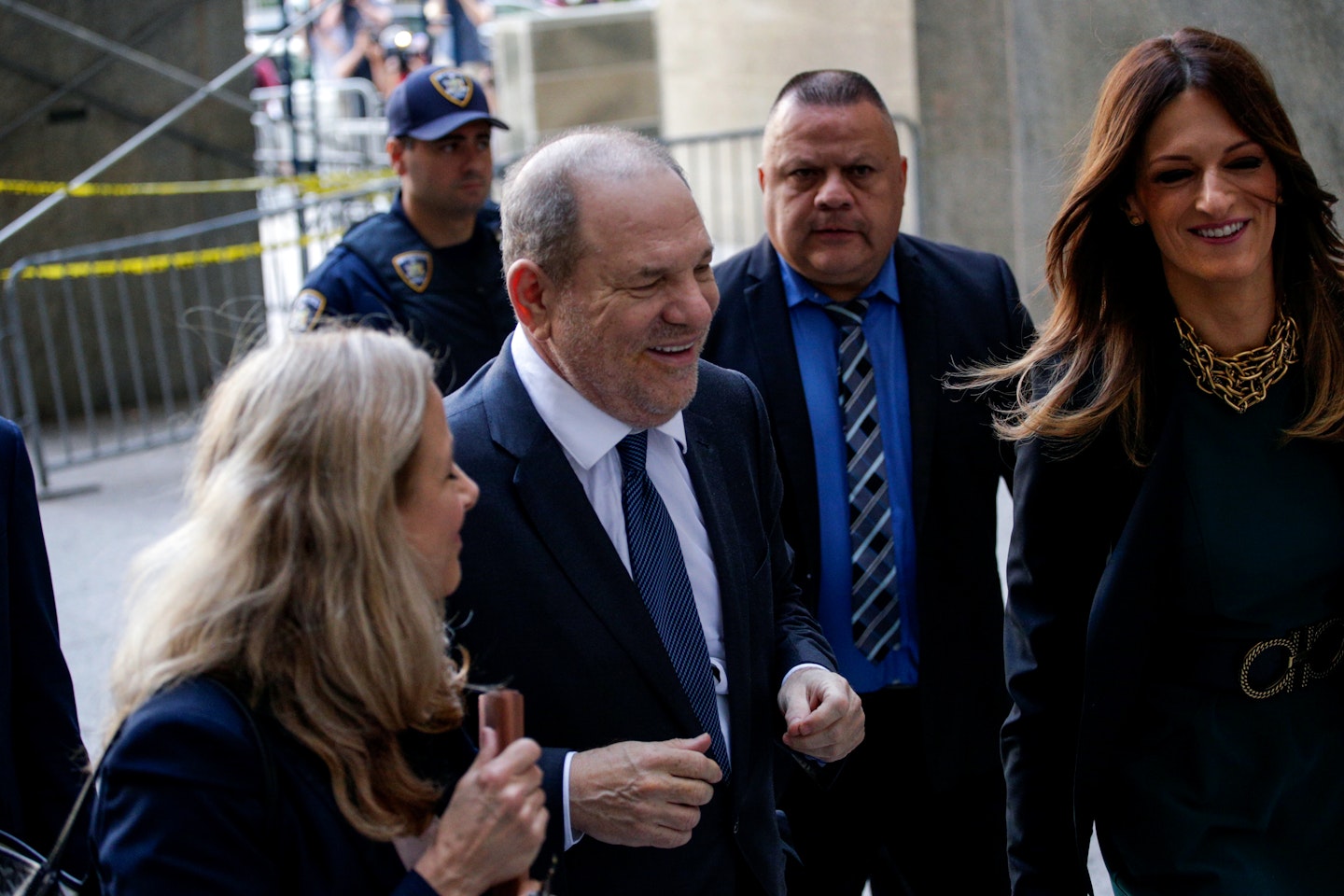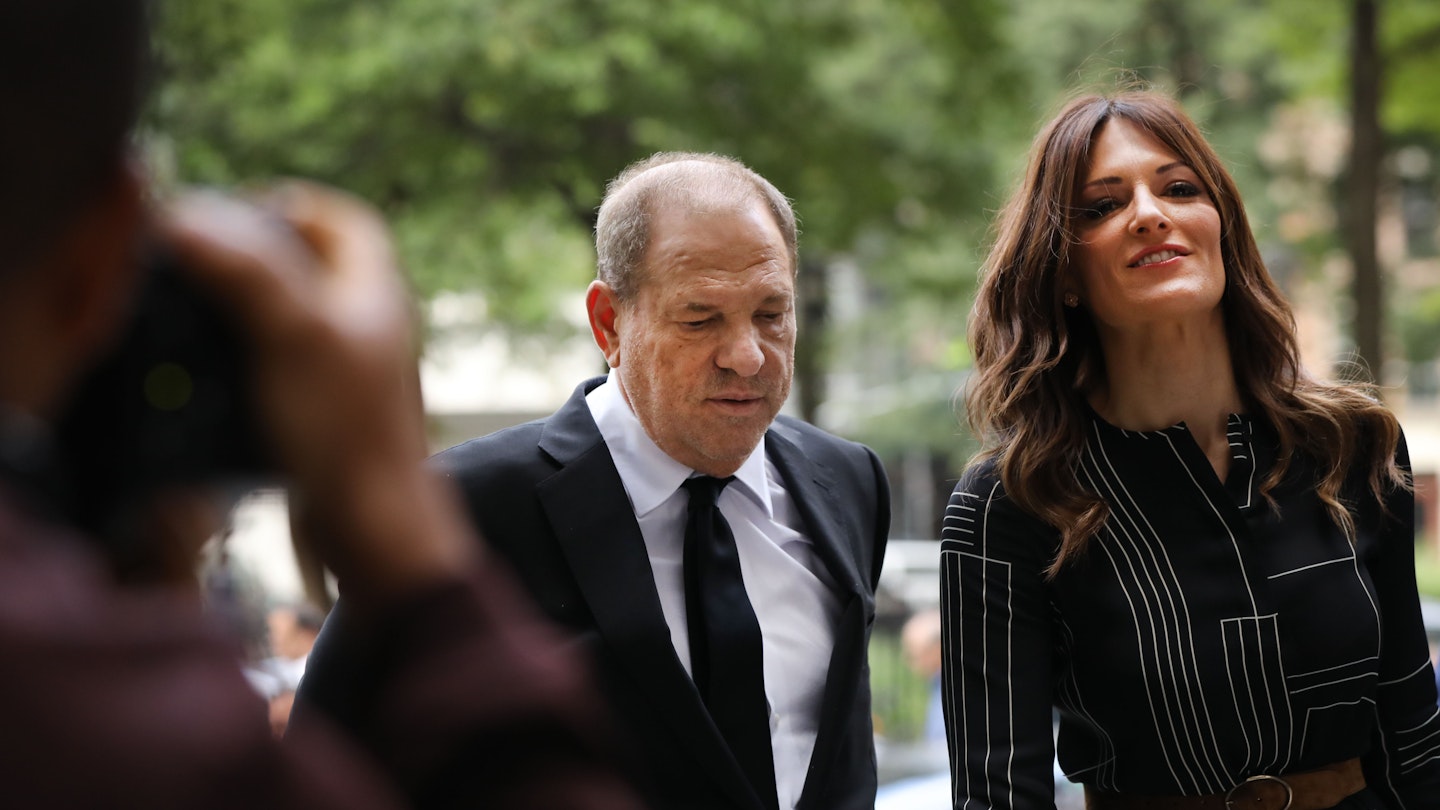Harvey Weinstein’s trial kicked off today after weeks of jury selection, with opening statements from the prosectution expected to outline an alleged pattern of predatory behaviour. Defending him is a team of lawyers led by Donna Rotunno, a woman once described as the ‘Harvey whisperer’ by the alleged rapist himself. Known for defending accused rapists, Rotunno has handled over 40 sexual misconduct cases in the last 15 years, according to Chicago Magazine.
Brought in to defend Weinstein eight months ago, Rotunno became 'the quarterback' on a team she says Weinstein cast like he would a movie. He had been awaiting trial for a year when he sought her out, advised by co-counsel Arthur Aidala that it was important to hire a female lawyer.
Last year saw a multitude of tumultuous developments for his defence team, including Weinstein's former personal assistant, Zelda Perkins, breaking a 20-year non-disclosure agreement to expose the alleged rape of another colleague. Weinstein ran through prominent lawyers quickly, abandoned by three in quick succession. Jose Baez, his second lawyer, cited the producer as 'unreasonably difficult' in his request to leave the case, telling journalists, 'I feel like I won the lottery... just kidding,' when a judge granted his request.
'You have to remember, this is really all Harvey has to focus on right now,' Rotunno told Vanity Fair of Weinstein's behaviour. 'I think he looks at this as an opportunity to be involved in a project.'
As a woman who has made a career defending men accused of a crime that affects one in three women, with staggeringly low conviction rates, Rotunno is someone many are curious to get to know.
A number of profiles have been published about Rotunno over the years, most recently by Vanity Fair. In the interview, Rotunno says Weinstein’s accusers ‘used’ him for career gains and describes the #MeToo movement as women being 'overly sensitive'.
'Men can’t really be men, and women can’t really be women,' she told Vanity Fair. 'I feel that women may rue the day that all of this started, when no one asks them out on a date, and no one holds the door open for them, and no one tells them that they look nice.'
For a woman that deals with sexual violence crimes so often, her understanding of gender politics is striking. 'If women want equal rights and equal pay and equal opportunity, then you have to also take equal responsibility,' she said in reference to rape accusers.
Growing up in Chicago, Rotunno says her legal career was influenced by her father’s philosophies on work. 'My father always taught me, "never let your emotions cloud your intellect",' she said. 'I really live with that principle in the back of my mind.'
It’s something she had to do during a case in 2010 when she defended DeMarco Whitley, 17. Whitley was accused of raping a 15-year-old classmate in the back of his car. She cross-examined the teenage girl on the stand, accusing her of fabricating the claim because there was no physical evidence of a struggle (there was no bruising or scratches) and the girl had seemingly not tried to leave the car.
She felt bad for the victim, she told Chicago Magazine, because 'she was a young girl. She was in high school and I really had to go at her'. But that’s not her biggest regret. No: the case haunts her, she says, because she lost it and Whitley was sentenced to 16 years. ‘Even if he was responsible for some of it, the penalty was much too harsh,' she said. 'People who shoot people dead on the street get less time.' She keeps a picture of Whitley in her office to remind her of how high the stakes are in these cases - for the accused, not the victim.
Other defence tactics of Rotunno’s include one 2013 rape trail, where she presented security camera footage taken days after the alleged incident, which showed the accuser interacting with the accused. Rotunno pointed out that the woman was wearing pyjama pants that matched a top she had handed to police as evidence in the case. 'Of all the clothes in your closet,’ Rotunno said to the woman in court, 'the ones you choose to wear to meet your “rapist” were the pants you were raped in?'
Her client was let off.

Defending Weinstein, of course, is a much bigger job. But the defence strategy her team have put together is not dissimilar from her typical toolbox. Rotunno and her team reportedly plan to characterise one accuser of engaging in a 'long-term affair' with Weinstein. The woman in question has accused Weinstein of raping her in a DoubleTree hotel room.
The team will show the court emails between the accuser and Weinstein after the attack. 'I think a woman who is a victim of rape is going to look at that and say, “That’s not what rape victims do." If you were really raped, this is not what you do'. Rotunno told Vanity Fair. 'In this case, I almost think somebody who is a real victim of rape might not be a bad juror.'
It seems that Rotunno has built a career relying on misconceptions around trauma responses. Because, according to the National Sexual Violence Resource Center in the US, one in ten women have been raped by an intimate partner. More than that, psychologists have repeatedly warned that there is no right or wrong way to react after being raped. There are a number of nuanced reasons for different responses to trauma like rape, and importantly, the power dynamic between a perpetrator and victim does not end when that particular incidence of rape stops.
Jurors, of course, may fall foul to the misconceptions about trauma responses so many do. Rotunno is also planning to suggest Weinstein accusers had consensual sex with the producer but regretted it afterwards. 'I think it’s easy to look back and say, “Oh, you know, maybe I didn’t love that experience”,' she says. 'Regret sex is not rape.'
And, that Weinstein was the one used by his accusers – not the other way round. ‘The prosecutors are going to say Harvey Weinstein was this powerful guy that could get anything he wanted and went to any measure to get whatever he wanted,' she said. 'I look at it the exact opposite way. I look at Harvey Weinstein and I say, “Harvey Weinstein was the guy that held the keys to the castle that everyone wanted to get into. And what people did was they used him, and used him, and used him, and used him".'
But will such a defence strategy succeed? While experts are wary of predicting a definitive outcome, US journalist Jodi Kantor - who, alongside Megan Twohey, published the original expose of Weinstein back in 2017 - remains cynical of Weinstein ever being held accountable.
'The defense and prosecution have both had problems, and relatively little is known at this point about the 2013 rape accusation at the center of the trial,' she told Variety. 'The majority of allegations against Weinstein are for sexual harassment, which is not a criminal offense — and the lawsuits that do seek to hold him accountable for harassment have seemed stuck for months.
'So, the looming question is: Will Harvey Weinstein face any legal accountability at all?' she concludes.
Wouldn't we all like to know.
Read More:
Harvey Weinstein Says He Has Done More For Women Than Any Other Filmmaker
Could Harvey Weinstein's Trial Mark The Start Of His Comeback?
